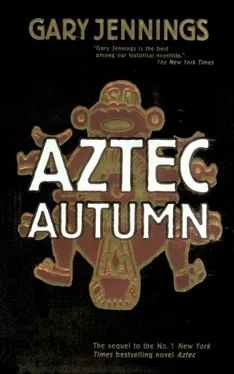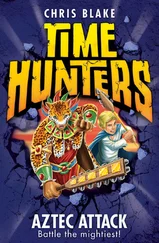Gary Jennings - Aztec Autumn
Здесь есть возможность читать онлайн «Gary Jennings - Aztec Autumn» весь текст электронной книги совершенно бесплатно (целиком полную версию без сокращений). В некоторых случаях можно слушать аудио, скачать через торрент в формате fb2 и присутствует краткое содержание. Жанр: Старинная литература, на английском языке. Описание произведения, (предисловие) а так же отзывы посетителей доступны на портале библиотеки ЛибКат.
- Название:Aztec Autumn
- Автор:
- Жанр:
- Год:неизвестен
- ISBN:нет данных
- Рейтинг книги:4 / 5. Голосов: 1
-
Избранное:Добавить в избранное
- Отзывы:
-
Ваша оценка:
- 80
- 1
- 2
- 3
- 4
- 5
Aztec Autumn: краткое содержание, описание и аннотация
Предлагаем к чтению аннотацию, описание, краткое содержание или предисловие (зависит от того, что написал сам автор книги «Aztec Autumn»). Если вы не нашли необходимую информацию о книге — напишите в комментариях, мы постараемся отыскать её.
Readers familiar with Mexican history will welcome the rich details of this vengeance drama; those new to it will be impressed by Jennings's exhaustive research.
Aztec Autumn — читать онлайн бесплатно полную книгу (весь текст) целиком
Ниже представлен текст книги, разбитый по страницам. Система сохранения места последней прочитанной страницы, позволяет с удобством читать онлайн бесплатно книгу «Aztec Autumn», без необходимости каждый раз заново искать на чём Вы остановились. Поставьте закладку, и сможете в любой момент перейти на страницу, на которой закончили чтение.
Интервал:
Закладка:
But I am getting ahead of my chronicle. At the time I settled in the City of Mexíco, there were not so many mestizos and mulatos and other mongrels to be seen. I had passed my nineteenth birthday some while back—though exactly when, by the Christian calendar, I could not say, since I was not then very familiar with that calendar. Anyway, the white and black conquerors had not yet been among us for long enough to have produced more than those very young offspring, such as I saw in my Colegio classes.
What I did see on the streets, though, from my first arrival and ever afterward, was a much greater number of drunken people than I had ever seen even at the most licentious religious festivals in Aztlan. Many men, and more than a few women, could be seen at all hours, day or night, staggering about or even collapsed unconscious where sober passersby had to step over them. Our people, even our priests, had never been totally abstemious, but neither had they often overindulged—except at festivals—in the intoxicating beverages like Aztlan's fermented coconut milk or the tesgúino that the Rarámuri make from maize or the chápari that the Purémpecha make from bees' honey or the everywhere-common octli, which the Spaniards call pulque, made from the metl plant, which the Spaniards call maguey.
I could only suppose that the Mexíca citizens had taken to drinking to excess in order to forget for a while their utter defeat and despair, but Cuatl Alonso disagreed with that notion.
"It has been amply evidenced," he said, "that the entire race of indio peoples is susceptible to the gross effects of drink, and fond of those effects, and desirous of attaining those effects at every least opportunity."
I said, "I cannot speak for the inhabitants of this city, but I have never known the indios elsewhere to be so."
"Well, we Spaniards have subdued many other peoples," he said. "Berbers, Mohammedans, Jews, Turks, Frenchmen. Not even the Frenchmen took to mass drunkenness as a result of their defeat. No, Juan Británico, from our years-ago landing in Cuba to the farthest extent that we have secured this New Spain, we have found the natives to be natural-born sots. De León reported the same of the red men in Florida. It appears to be an inherent physical failing in your people, much the same as their so easily dying from such trivial diseases as measles and the small pocks."
"I cannot deny that they sicken and die," I said.
"The authorities, especially Mother Church," he said, "have compassionately tried to lessen the temptation that drink holds for the weakling indios. We have tried to convert them to Spanish brandies and wines, in the hope that those more highly intoxicating beverages would lead people to drink less of them. But of course only the rich nobles could afford them. So the gobernador set up a brewery in San Antonio de Padua—what used to be Texcóco—hoping to wean the indios onto the cheaper and weaker intoxicant called beer, but to no avail. Pulque remains the easiest available liquor, almost dirt-cheap, since anyone can make it even at home, hence it remains the most-favored way for an indio to get drunk. The authorities' only recourse has been to make a law against any natives drinking to excess, and jailing those that do. But even the law is impracticable. We should have to lock up almost the entire indio population."
Or kill them, I thought. I had recently watched as a middle-aged and very drunk woman, reeling and shouting incoherently, was seized by three soldiers of the force that regularly patrolled the city. They had not bothered to jail the woman. They had set upon her with the stocks of their thunder-stick weapons, and with seeming glee, until she was beaten unconscious. Then they used their swords, not to stab and kill but only to slash her repeatedly, crisscross-wise, all over her body, so that when the woman awoke from the beating—if she ever did—she would be conscious just long enough to realize that she was irremediably bleeding to death.
"Speaking of pulque," I said, to change the subject, "it is made from the metl, or maguey. And while we have been translating this newest text, Cuatl Alonso, I heard you speak of the maguey as a cacto. It is not. The maguey has spines, yes, but every cactus also has an internal woody skeleton, and the maguey does not. It is a planta, the same as any bush or grass."
"Thank you, Cuatl Juan. I am making a note. So—let us get on with our work, then."
I continued to sleep every night and to take my morning and evening meals at the Mesón de San José, while I passed my free Sundays in the several city markets, asking stallkeepers and passersby if they knew any persons named Netzlin and Citláli, formerly of the town of Tépiz. For a long while, my search was unsuccessful. But I was not wasting what time I spent, either at that endeavor or at the mesón.
Mingling with the city folk in the markets helped me refine my old-fashioned way of speaking Náhuatl and acquire the more modern vocabulary of the Mexíca. Also I associated as much as possible with those prosperous, far-traveled pochtéca who had brought goods from the south to sell in the city—and with the burly tamémime who had actually carried those goods—and thereby learned a useful number of words and phrases of the southern tongues: the Mixtéca language of the people who call themselves Men of the Earth, and the Tzapotéca of those who call themselves the Cloud People, even many words of the tongues spoken in the Chiapa and Quautemálan lands.
At the mesón, every night I was in the company of foreigners from the north, as I have said. Of those, as I have also said, the Chichiméca lodgers spoke a Náhuatl about as archaic as my own, but understandable. So I consorted mainly with foreigners of the Otomí and Purémpecha and the so-called Runner People, thereby learning useful fragments of the Otomíte and Poré and Rarámuri languages. I had never before had any occasion, back home in my own land, to discover my considerable facility for learning other tongues, but now it was evident to me. And I supposed that I must have inherited the ability from my late father, because he must have acquired it during his extensive travels throughout The One World. I will say this, however: the languages of our peoples, though they might be very different from Náhuatl, and sometimes difficult for me to enunciate, none was so very different and difficult as the Spanish, or took me as long to gain fluency in.
At the mesón, also, on any night I could engage in conversation that long-time city dweller, the former jewelsmith Pochotl, who obviously had determined to spend the rest of his life battening on the hospitality of the San José friars. Some of our talks consisted of my merely listening, and trying not to yawn, as he recited his innumerable grudges and grievances against the Spanish, against the tonáli that from his birth had predestined his present misery, and against the gods who had laid that tonáli on him. But more often I listened more attentively, for he had really informative things to tell. For example, Pochotl provided my first knowledge of the orders and ranks and authorities by which New Spain was ruled and governed.
"The very topmost personage," he said, "is a certain man named Carlos, who resides back in what the Spaniards call the Old World. He is sometimes referred to as 'king,' sometimes as 'emperor,' sometimes as 'the crown' or 'the court.' But clearly he is the equivalent of a Revered Speaker, such as we Mexíca once had. A good many years ago, that king sent ships full of warriors to conquer and colonize a place called Cuba, which is a very large island in the Eastern Sea, somewhere beyond the horizon."
"I have heard of it," I said. "It is now populated by varicolored mongrel bastards."
Читать дальшеИнтервал:
Закладка:
Похожие книги на «Aztec Autumn»
Представляем Вашему вниманию похожие книги на «Aztec Autumn» списком для выбора. Мы отобрали схожую по названию и смыслу литературу в надежде предоставить читателям больше вариантов отыскать новые, интересные, ещё непрочитанные произведения.
Обсуждение, отзывы о книге «Aztec Autumn» и просто собственные мнения читателей. Оставьте ваши комментарии, напишите, что Вы думаете о произведении, его смысле или главных героях. Укажите что конкретно понравилось, а что нет, и почему Вы так считаете.











